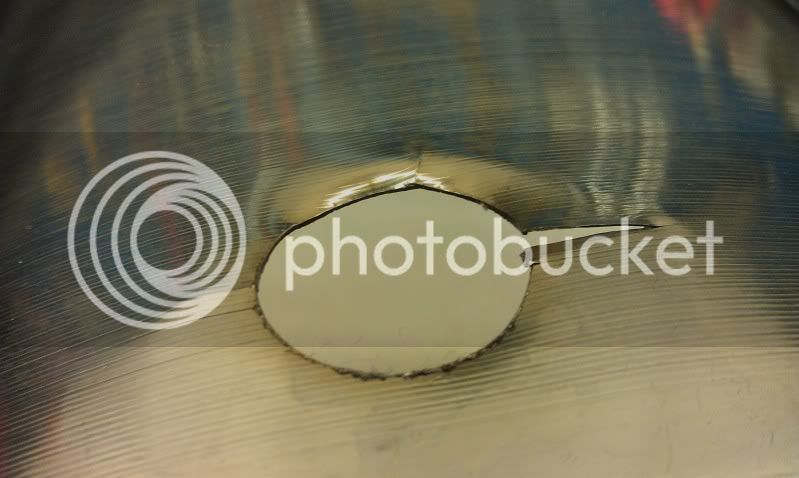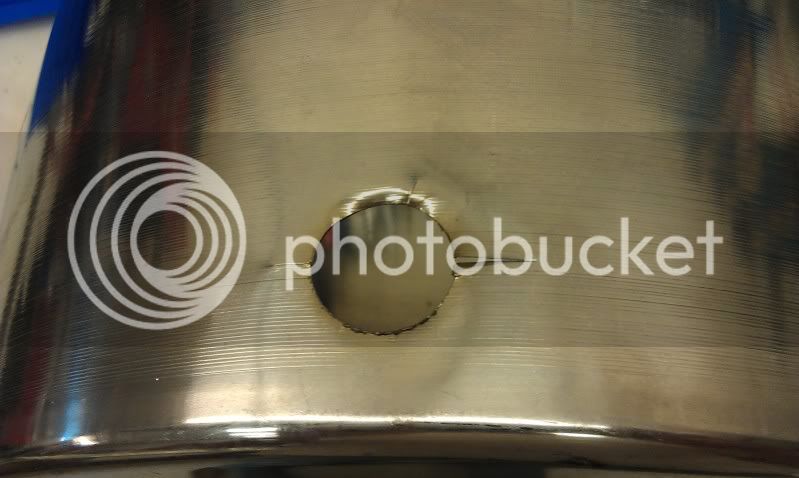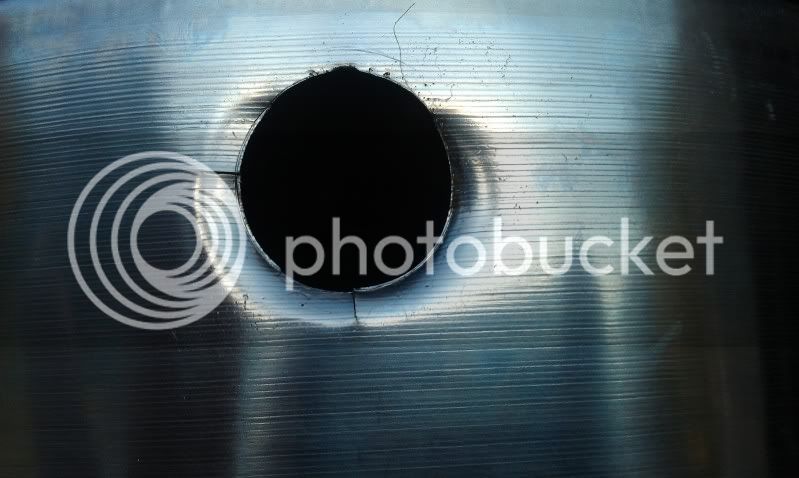Well Guys,
I just ruined what I was going to use as a MLT in a Countertop Brutus 20 build this week. I read all the stainless soldering threads and being a car guy and an engineer, had little worries about this project. I've done soldering and welding before so I had a decent idea about what was going on.
I started by drilling a hole in the lid so that I could solder in a coupling to use for recirculation. I didn't use any lubricant due to the fears I heard about the hydrocarbon contamination and even though the steel got a bit hot, I had no problems and it turned out perfect once I soldered it.
Now I had some confidence and was going to take the plunge and drill the stainless kettle. I used a punch and marked the hole and started drilling. I again did not use any lubricant but I did use a higher quality step bit and everything went really well until I ran out of steps on the good step bit. This left me at an 11/16" diameter hole so I decided to use the lower quality step bit to finish out to the 7/8" diameter hole I needed. Unfortunately, just as I was about to break through to the 7/8" diameter step, the bit caught a little bit and tore a nice big gouge in my kettle. I was stunned. I've drilled more holes than I can count in sheet metal and I have never seen anything like this. From what I can tell, it was a combination of drill speed, drill bit quality, stainless quality and stress concentrations due to the manufacturing process. You can see in the pictures below, the tear is perfectly linear and it follows the tooling marks around the circumference on the pot.
Once this happened, I decided to do some more research and I found that you can use olive oil as a lubricant and not risk the contamination. So I decided I had already ruined the pot and I might as well try and learn from this so I decided to drill another hole. Everything except the oil was the same. The oil never even began to smoke and indicate too much heat, yet I had the EXACT same results.
At this point I had accepted that I will need to purchase two new kettles (already needed one for the system) but now i have major concerns with trying this same process on one of the economy brew kettles I was eying up with any on the online HB stores. Are this pots going to be any better than this cheapo 4 gallon that I just ruined? Am I doing something wrong that I just can't see?


I appreciate any help you guys can give me. It is very frustrating to have stuff like this happen when it feels like such an easy project to complete.
Caleb
I just ruined what I was going to use as a MLT in a Countertop Brutus 20 build this week. I read all the stainless soldering threads and being a car guy and an engineer, had little worries about this project. I've done soldering and welding before so I had a decent idea about what was going on.
I started by drilling a hole in the lid so that I could solder in a coupling to use for recirculation. I didn't use any lubricant due to the fears I heard about the hydrocarbon contamination and even though the steel got a bit hot, I had no problems and it turned out perfect once I soldered it.
Now I had some confidence and was going to take the plunge and drill the stainless kettle. I used a punch and marked the hole and started drilling. I again did not use any lubricant but I did use a higher quality step bit and everything went really well until I ran out of steps on the good step bit. This left me at an 11/16" diameter hole so I decided to use the lower quality step bit to finish out to the 7/8" diameter hole I needed. Unfortunately, just as I was about to break through to the 7/8" diameter step, the bit caught a little bit and tore a nice big gouge in my kettle. I was stunned. I've drilled more holes than I can count in sheet metal and I have never seen anything like this. From what I can tell, it was a combination of drill speed, drill bit quality, stainless quality and stress concentrations due to the manufacturing process. You can see in the pictures below, the tear is perfectly linear and it follows the tooling marks around the circumference on the pot.
Once this happened, I decided to do some more research and I found that you can use olive oil as a lubricant and not risk the contamination. So I decided I had already ruined the pot and I might as well try and learn from this so I decided to drill another hole. Everything except the oil was the same. The oil never even began to smoke and indicate too much heat, yet I had the EXACT same results.
At this point I had accepted that I will need to purchase two new kettles (already needed one for the system) but now i have major concerns with trying this same process on one of the economy brew kettles I was eying up with any on the online HB stores. Are this pots going to be any better than this cheapo 4 gallon that I just ruined? Am I doing something wrong that I just can't see?


I appreciate any help you guys can give me. It is very frustrating to have stuff like this happen when it feels like such an easy project to complete.
Caleb



